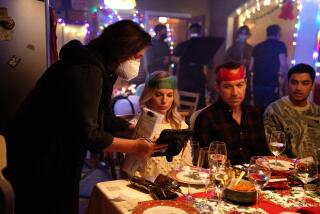What you can learn from difficult sibling relationships
- Share via
If you’re still smarting from some hurtful exchange with--or deafening silence from--a sibling over the holidays, a book out this week might help you make sense of your strained relationship with a sister or brother. The book, “Cain’s Legacy,” may not prompt you to patch things up with a sibling who’s angry, jealous, entitled, bossy or makes you feel like a monster or an idiot (its author gamely acknowledges that sometimes, that’s just not worth it). But by rooting around inside the baggage of one of life’s earliest relationships, it might make your emotional burden a little easier to bear.
“Cain’s Legacy” (Basic Books), by New York psychotherapist Jeanne D. Safer, bears a hefty promise in its subtitle: “Liberating Siblings from a Lifetime of Rage, Shame, Secrecy and Regret.” Safer sets out to do this by reassuring readers, first, that in their experience of a difficult sibling relationship, they have company throughout the animal world and as old as the Bible (hence, “Cain’s Legacy”). She cites research finding that at least one-third of adults in America own up to a difficult sibling relataionship. Even the father of psychoanalysis, Mama Freud’s “golden little Siggy,” bore the brunt of his seven younger siblings’ resentment. And like most of us, Sigmund Freud was not keen to explore the power of that sibling relationship, Safer writes.
Second, as a therapist in the psychoanalytic tradition, Safer lays the blame for setting your difficult relationship into motion squarely at your parents’ feet. One or both of them chose one child over his or her siblings for favor. One or both of them rested their hopes and dreams on one child and let the dead hand of their disappointment fall on another. One or both of them re-created their own sibling relationships in those of their children, or chose to deny that sibling rivalry could exist in their perfect household.
The result: “Rivalry, competition and anxiety about your place in your parents’ affections...[breed] rancor that haunts siblings all their lives and occurs in each phase of adulthood--work, marriage, parenthood, caring for aging parents, and eventually, settling that perpetual minefield, the estate.” When the adult you looks in the mirror, “your difficult sibling always looks back, though the image is distorted. In the shadows lurk part of yourself and your past that you don’t want to notice,” Safer writes.
But you’re an adult now. And taking a hard look at that relationship--how it started, what went wrong, how all the hurt and blame and competition played itself out for you and your sibling--would be a first step to defusing its power to wound. Safer offers a detailed taxonomy of toxic sibling relationships, cites anecdotes from interviewees who shared their stories with her. True to her calling, she turns those examples this way and that to point out the distortions, miscommunications and missed opportunities that gave these relationships such enduring power over both siblings.
Safer has written books that upend many of the pieties most of us hold dear. Forgiveness is not an unconditional good, she wrote in one (see her quoted here on that). Often our lives get better after our parents die, she wrote in another book. Here, she takes another universal problem and insists that her readers not “gloss over the dark side of life.”
At $25.99 in hardback, it’s probably more than you paid for your sibling’s holiday gift. But it’s a lot cheaper than years of therapy.







